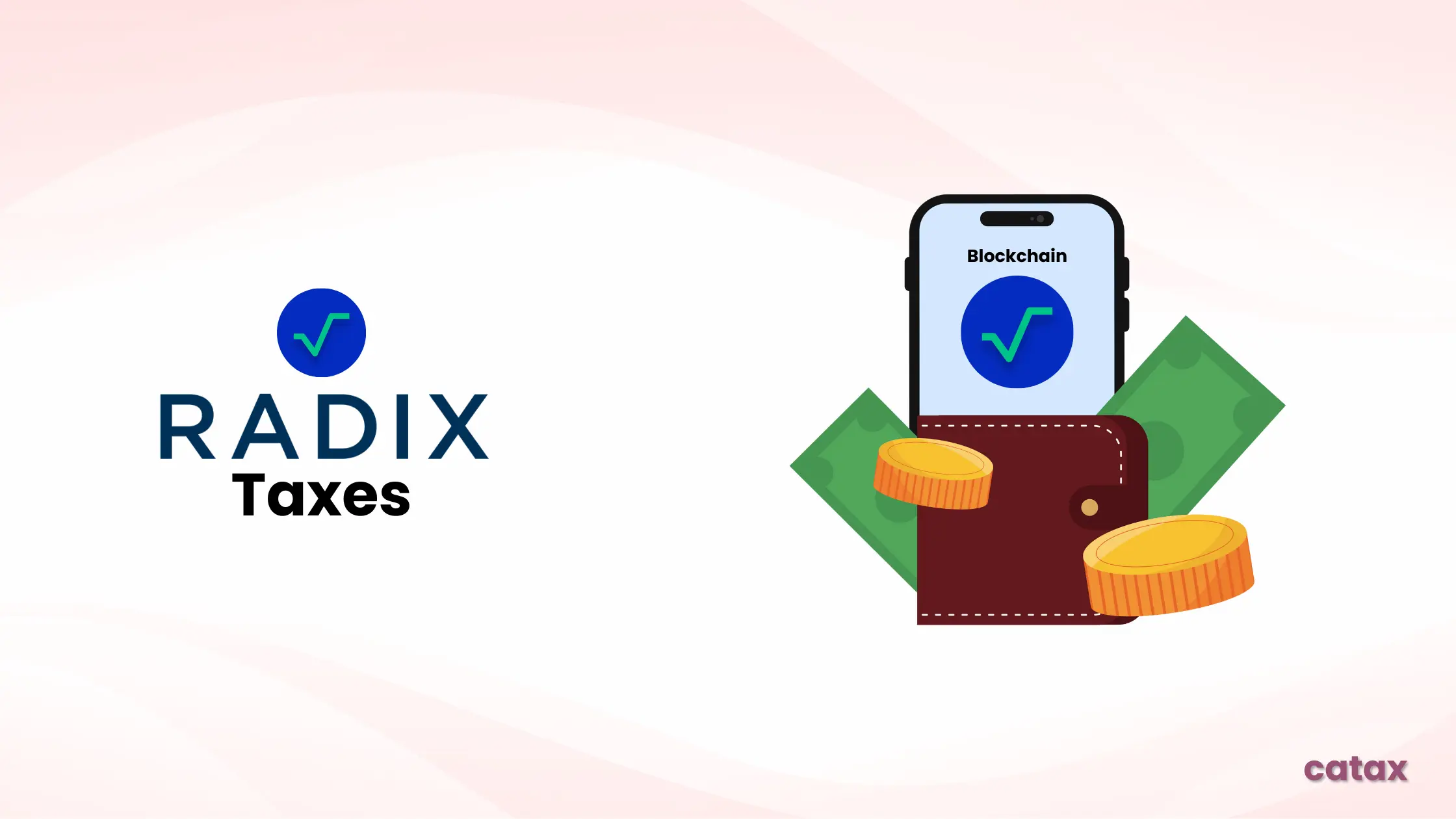Cryptocurrency tax rules differ in every country, and Radix (XRD) taxes transactions may be taxed based on local laws. Whether you buy, sell, trade, or stake XRD, knowing how tax authorities classify these activities helps you follow tax rules and avoid penalties.
This guide explains Radix taxes in a simple way so you can stay compliant and manage your taxes properly.

- How to Connect Your Radix Wallet to Catax
- Are Radix (XRD) Transactions Taxable?
- Can You Deduct Trading Fees and Other Costs?
- How Is Radix (XRD) Taxed Based on Holding Period?
- How Is Staking Income Taxed?
- How Countries Tax Staking Rewards
- Can You Claim Radix Losses for Tax Benefits?
- How to Stay Compliant with Radix (XRD) Tax Rules
How to Connect Your Radix Wallet to Catax
To track your Radix (XRD) transactions and calculate taxes easily, follow these steps to connect your wallet to Catax:
- Open your Radix wallet or use a block explorer (such as Radix Wallet, Ledger, or another supported wallet).
- Copy your public wallet address from your wallet.
On Catax:
- Log in to Catax and choose your country.
- Select Chain, then search for Radix Wallet.
- Paste your public address and click Connect.
Once connected, Catax will automatically track your XRD transactions and make tax calculations easy.
Calculate My Taxes ➤Are Radix (XRD) Transactions Taxable?
Yes, in most countries, Radix transactions are taxable. Governments may treat XRD as a capital asset, property, or income, depending on how you use it.
When Do You Have to Pay Taxes on Radix?
You may owe taxes when you:
- Sell XRD for a profit – If you sell Radix for more than what you paid, the profit is taxed as capital gains.
- Trade XRD for another cryptocurrency – Swapping Radix for assets like Bitcoin or Ethereum may be considered a taxable event.
- Use XRD to buy something – Spending Radix may trigger capital gains tax if the token’s value increased since you acquired it.
- Earn XRD from staking – In many countries, staking rewards are taxed as income when received.
- Get paid in XRD – If you’re paid in Radix for services or work, it’s typically taxed as income at the market value at that time.
Tax laws differ worldwide, so check how Radix transactions are taxed in your country to stay compliant.
Can You Deduct Trading Fees and Other Costs?
Many Radix users wonder if fees and related expenses are tax-deductible. That depends on your country’s tax laws.
Some countries allow deductions for:
- Trading fees incurred during XRD transactions.
- Network (transaction) fees for transferring XRD.
- Security and storage costs like hardware wallets or private key tools.
Other countries may only allow:
- Deduction of the original purchase price (cost basis) of XRD, but not other fees like exchange or network charges.
Check your local tax regulations to know what deductions you’re entitled to.
How Is Radix (XRD) Taxed Based on Holding Period?
The tax rate on your Radix profits may depend on how long you hold the tokens:
- Short-term holdings (less than 1 year) – Often taxed at standard income tax rates.
- Long-term holdings (more than 1 year) – May qualify for reduced tax rates in some jurisdictions.
- Flat tax systems – A few countries apply the same tax rate regardless of holding period.
Understanding your country’s tax system helps you plan smarter and potentially save on taxes.
You can also check out our Country-Specific Guide for Crypto in Your country. This guide provides insights on regulations, tax implications, and compliance measures breifly explained for each country.
How Is Staking Income Taxed?
Radix (XRD) staking rewards can be a great way to earn passive income, but how they are taxed varies by country. Some governments tax staking rewards the moment you receive them, while others apply tax only when you sell or exchange the tokens.
How Countries Tax Staking Rewards
- Taxed as income – In some jurisdictions, Radix staking rewards are treated like salary or freelance income. This means taxes are due when you receive the rewards, typically at standard income tax rates.
- Taxed as capital gains – In other countries, staking rewards are only taxed when you sell or convert them. In this case, only the profit from the sale is subject to tax.
If you’re staking XRD, understanding when the tax liability begins is crucial for accurate tax planning. Some countries require you to report staking income even if you haven’t sold your rewards.
Check your country’s specific tax treatment before you begin staking Radix to avoid unexpected tax bills.
Can You Claim Radix Losses for Tax Benefits?
Not all Radix trades will be profitable, but losses may help reduce your tax burden. Here’s how different countries deal with crypto losses:
- Loss offsets – Some tax systems allow you to use Radix losses to reduce your overall capital gains, meaning you’re taxed only on your net profits.
- Loss carryforward – If you don’t have gains this year, you might be able to carry your Radix losses forward to offset future profits.
- Limited deductions – In certain countries, crypto losses aren’t tax-deductible, so you can’t use them to reduce your tax bill.
To take advantage of any eligible deductions or offsets, keep accurate records of all your Radix transactions, including gains and losses.
How to Stay Compliant with Radix (XRD) Tax Rules
With crypto tax laws constantly evolving, it’s important to stay informed and compliant. Here’s how:
- Understand how your country taxes Radix – Determine whether Radix is taxed as capital gains, income, or business revenue.
- Check eligibility for deductions – Learn whether you can deduct fees, staking income, or other expenses under your local tax laws.
- Keep detailed transaction records – Log every Radix activity, including buys, sells, trades, staking, and spending.
- Use a tax tool like Catax – Catax simplifies tax reporting by automatically tracking your Radix transactions and calculating taxes for you.
- Consult a tax professional – If you’re unsure about local crypto tax regulations, a professional can help ensure you’re compliant and optimize your tax strategy.


